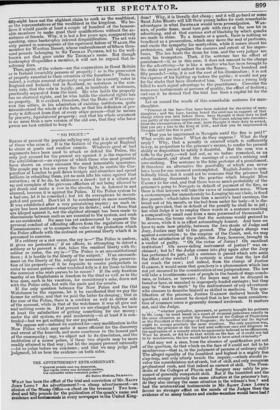" NO POLICE l "
SEEMS at present the popular rallying-cry, and it is not unworthy of those who raise it. It is the fashion of the people of England to strain at gnats and swallow camels. Whatever good or bad arguments have been used to attack or defend the Police, the only just ground for the present cry against it is the expense of the establishment—an expense of which those who most grumble have shown on every occasion the most lamentable ignorance. The people pay a tax on every fire they light, to enable the Cor- poration of London to pull down bridges and churches and spend millions in rebuilding them, yet no man lifts his voice against that extortion ; or if he do, he addresses a desert: but if a citizen get up and complain of the grievous affliction of not being allowed to get drunk and make a row in the streets, he is listened to and cheered, because it is against the Police. If the Police system be a bad one, let it be remedied ; but let its corruptions be investi- gated and proved. Don't let it be condemned on mere assertion. It was established after a very painstaking inquiry ; no such in- quiry has been instituted respecting its defects ; and of those that are alleged against it, not the slightest attempt has been made to discriminate between such as are essential to the system, and such as are accidental. No man has yet endeavoured to separate the personal conduct of offending officers from the regulations of the Commissioners; or to compare the value of the protection which the Police affords with the restraint on personal liberty which it is presumed to exercise. If a robbery or a riot occur, the my is—" The Police is useless, it gives no protection ;" if an officer, in attempting to detect a robbery or to prevent a riot, takes the smallest liberty with the. robber or rioter, the cry is—" The Police is an unconstitutional force ; it is hostile to the liberty of the subject." If an encroach- ment on the liberty of the subject be necessary for the preserva- tion of his property—if it be requisite to coerce pickpockets in order to secure purses—what wretched folly is it for those to blame the coercion who wish purses to be secure ? If the only freedom worthy of an Englishman is freedom to the thief as well as to the true man, each in his vocation, for consistency's sake, down not with the Police only, but with the gaols and the courts.
If the only question between the New Police and the Old Watchmen be the expense, let it be recollected that we pay the former for acting, and that we paid the latter for sleeping; that in the case of the Police, there is a creditor as well as debtor side of the account, while in that of the watchmen it was all give out and nothing come in. If at present we are charged high, we have at least the satisfaction of getting something for our money: under the old system, we paid moderately—so at least it is con- tended—but we got nothing for our payment. We oppose not—indeed we contend for—any modification in the New Police which may make it more efficient for the discovery and arrest of the knavish, and more courteous to the honest part of the community ; nay, we object not to its dissolution, and the institution of a newer police, if these two objects may be more readily attained in that way; but let the inquiry proceed rationally —let us judge before we condemn ; and that we may judge just judgment, let us hear the evidence on both sides.


























 Previous page
Previous page